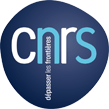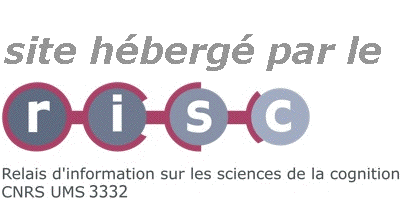Tags
Les tags sont des mots-clefs associés aux ressources du site
Les tags sont des mots-clefs associés aux ressources du site
Contenus associés au tag apprentissage
Liens :
-
Site du laboratoire EDA
Tags : didactique, education, apprentissage, tice
Le laboratoire EDA est co-responsable du groupe de travail "Curricula, contextes formels et informels d’apprentissage, modalités d’enseignement".
-
S.-J. Blackemore, U. Frith: The learning brain
Tags : cognition, gt1, neurosciences, apprentissage, livre
Synthèse de la littérature en neurosciences significative pour éducation/apprentissage
-
Centre for Educational Research and Innovation (CERI) - Brain and Learning
Tags : gt1, apprentissage, cognition, neurosciences, rapport, projet
Is the current classroom model of learning “brain-unfriendly”? Why are students failing to master numeracy and literacy skills efficiently enough to be employable? Why are one out of six students disruptive and school-haters? Since 1999, CERI's “Brain and Learning” project has been working towards a better understanding of the learning processes of an individual’s lifecycle.
-
Cognitive science in France map
Tags : gt1, cognition, apprentissage, france, carte
Carte des sciences cognitives en France produite par le RISC: permet d'identifier laboratoires de sciences cognitives qui s'occupent d'apprentissage.
-
Les vidéo de la journée de restitution du projet PIRSTEC
Tags : gt1, cognition, apprentissage
Série de vidéos qui résument les résultats du projet PIRSTEC. A signaler en particulier: Apprentissages et éducation
-
Les documents du domaine apprentissage du projet PIRSTEC
Tags : gt1, apprentissage, cognition
Documents produits par l'équipe du projet PIRSTEC dédiée aux apprentissages
-
UnEuropean Association for Research on Learning and instructionSIG 22. Neuroscience and education
Tags : gt1, apprentissage, cognition, neurosciences
The SIG brings together researchers from the fields of educational research, cognitive (and developmental) psychology and (cognitive) neuroscience as well as interdisciplinary people with training in each of these fields, all of which investigate human learning and development.
-
Educational neuroscience: is it a field? First conference of EARLI SIG22 Neuroscience and education
Tags : gt1, apprentissage, cognition, neurosciences
The field of educational neuroscience (or at least collaborations between neuroscience and education) emerged for the first time more than 10 years ago. With the advent of centres for educational neuroscience and mind, brain and education, it is of particular importance to ask: Where are we now?
-
Horizon report 2010
Tags : gt1, gt3, apprentissage, education, ict
In each edition of the Horizon Report, six emerging technologies or practices are described that are likely to enter mainstream use on campuses within three adoption horizons spread over the next one to five years. Each report also presents critical trends and challenges that will affect teaching and learning over the same time frame.
-
Learnovation
Tags : gt1, gt3, apprentissage, education, ict
The foresight activity of Learnovation is framed within its goal of building a new vision of technology enhanced learning in Europe, by means of a consensus process which overcomes traditional borders of education and training and addresses learning in a much broader perspective, centred on its role in innovation and lifelong learning implementation, and in light of a policy advising perspective.
-
OCDE: Learning for jobs
Tags : gt4, gt1, apprentissage, travail, gt2
-
OCDE: Apprentissage formel et informel
Tags : gt1, gt3, apprentissage informel, apprentissage
-
OCDE: Assessing the effects of ICT in education
Tags : gt1, gt3, apprentissage, tic, education
-
Royal Soiciety: Brain waves (policy science)
Tags : gt1, neuroscience, apprentissage, sciences dans la société
The Royal Society’s Brain Waves project is investigating developments in neuroscience and their implications for society and public policy. The project will be led by a Steering Group Chaired by Professor Colin Blakemore FRS.
Documents
-
U. Goswami: Neuroscience and education
Tags : cognition, apprentissage, neurosciences, gt1, article de synthèse
Goswami, U. (2006). Neuroscience and education: from research to practice? Nature Reviews Neuroscience, 7, 406-413 Pour des extraits voir site Compas (www.groupe-compas.net) -
E. Stern: Pedagogy meets neuroscience
Tags : cognition, gt1, neurosciences, apprentissage, article
Stern, E. (2005). Pedagogy meets Neuroscience. Science, 310, 745. -
Neuroscience and Education: Issues and opportunities. A commentary of TLRP-ESRC
Tags : cognition, gt1, neurosciences, apprentissage, rapport
Howard-Jones, P. (2008). Neuroscience and Education: Issues and opportunities. A commentary of the Teaching and Learning Research Programme TLRP-ESRC Pour des extraits consulter le site Compas (www.groupe-comps.net) -
Why mind, brain, and education? Why now?
Tags : cognition, gt1, neurosciences, apprentissage, article
Fischer, K. W., Daniel, D. B., Immordino-Yang, M. H., Stern, E., Battro, A., & Koizumi, H. (2007). Why mind, brain, and education? Why now? Mind, Brain, and Education, 1, 1–2 . Manifesto du MBE Voir entrée site Compas (http://www.groupe-compas.net) -
OCDE - Comprendre le cerveau. vers une nouvelle science de l'apprentissage
Tags : gt1, cognition, apprentissage, neurosciences, rapport
Pour des extraits: entrée sur site Groupe Compas http://www.groupe-compas.net/2010/02/23/comprendre-le-cerveau-vers-une-nouvelle-science-de-lapprentissage/ -
Potential educational developments involving neuroscience that may arrive by 2025 , P. Howard-Jones
Tags : gt1, apprentissage, cognition, neurosciences
Cet article fait partie des documents utilisés pour l'élaboration du rapport Beyond Current horizons 2010 http://www.beyondcurrenthorizons.org.uk/wp-content/uploads/neurologicalimplicationseducation_rs_20090202.pdf -
Sauvageot & Dalsheimer (2008). La situation éducative de la France comparée à celle d’autres pays de l’Union européenne ou de
Tags : education, apprentissage, comparaison
Cet article rend compte de la situation éducative de la France comparée à celle d’autres pays de l’Union européenne ou de l’OCDE au moyen de 30 indicateurs de comparaison internationale. Elle passe en revue les points forts comme le développement du préscolaire, et les points faibles comme l’effort budgétaire insuffisant pour l’enseignement supérieur, en distinguant ceux qui sont « bien connus » et ceux qui le sont moins. Il finit par une analyse des derniers résultats de l’enquête PISA. -
Brain Waves Module 2 : Neuroscience: implications for education and lifelong learning
Tags : gt1, cognition, neurosciences, apprentissage, sciences dans la société
http://royalsociety.org/brainwaves-education/ This report highlights advances in neuroscience with potential implications for education and lifelong learning. The report authors, including neuroscientists, cognitive psychologists and education specialists, agree that if applied properly, the impacts of neuroscience could be highly beneficial in schools and beyond.
Propositions
- GT 4 : Évolutions des contraintes sur les activités humaines et prise en compte de la diversité
Tags : travail, diversité, gt4, formation, apprentissage, ergonomie, sociologie, didactique professionnelle, économie, démographie, psychologie
Par catherine delgoulet le 23/6/2010 11:33 - Intervention de Pierre Pastré sur Développement et apprentissage en relation avec le travail
Tags : auditions, apprentissage, travail
Par ayuko sedooka le 3/5/2011 14:21 - Intervention de Todd Lubart sur l'apprentissages et la créativité
Tags : auditions, apprentissage, creativité
Par ayuko sedooka le 3/5/2011 15:53 - Intervention de Oliver Houde sur le développement cognitif de l’enfant et apprentissages : prospective 2030
Tags : sciences cognitives, apprentissage, auditions
Par Cecilia Stolwijk le 3/5/2011 15:55 - Intervention de Sylvain Hanneton : Handicap, technologie et apprentissage
Tags : handicap, technologie, apprentissage, auditions
Par Cecilia Stolwijk le 3/5/2011 16:13 - Intervention de Denis Meuret sur le contenu et l'usage de l’évaluation des apprentissages, évolutions récentes
Tags : auditions, évalutaion, apprentissage
Par ayuko sedooka le 3/5/2011 16:25
Evénements
- Lieu : Paris
- Organisateur : Comité d'organisation
Début du projet PREA2K30


